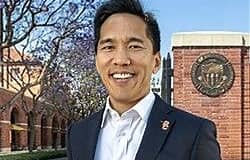One Lawyer President Lasted Only Six Days Before Tendering Resignation
- Patricia Salkin

- Nov 29, 2022
- 4 min read
Updated: Dec 3, 2022

People are often curious as to the longevity in office for college and university presidents. While tenures are often brief, such brevity is typically counted in years, not weeks or days (In fact the ACE 2017 Study on the American College President reported that the average tenure had decreased to 6.5 years down from seven years in 2011 and 8.5 years in 2006).
In the case of Anthony Roberts Appel, his time as President of Franklin and Marshall lasted a mere 52 days in 1962! Appel submitted his resignation after just six days on the job but stayed until the Board of Trustees named his successor at the end of the following month. Appel, who was 47 years old when he was appointed as the 10th president of Franklin and Marshall, resigned due to faculty dissatisfaction with the manner in which he was appointed following a forced resignation of his predecessor (Frederick de Wolfe Bolman) by the board of Trustees.
Upon learning of both the forced resignation of President Bolman and the appointment of President Appel, the faculty through their AAUP Chapter wrote the following to the Chair of the Board of Trustees:
The undersigned members of the faculty of Franklin and Marshall College, in response to tour announcement by telegram informing us of the replacement of Dr. Frederick deWolfe Bolman Jr. by Mr. Anthony R. Appel as President of Franklin and Marshall College, wish to make the following observation:
(1) It is our understanding that Dr. Bolman was requested to submit his resignation without having been given information concerning the basis for the request, and furthermore, was denied the opportunity to appear in his own behalf at the special meeting of the Board of Trustees held on September 5, 1962. We deplore this obvious violation of academic due process in short, we find it contrary to the fundamental concept of fair play inherent in judicial procedure.
(2) We are extremely distressed at the violation of the tradition established on this campus in which the faculty has participated in the selection of a President. Indeed by the action of the majority of the Members of the Board of Trustees in attendance at the meeting of September 5, Franklin and Marshall has fallen from its leadership among enlightened institutions with regard to participation of the faculty in the selection of a President. This is a grievous blow to the prestige of our College. To foist a President on a faculty not only demeans the faculty, it compounds the burden of an office staggering even under auspicious circumstances.
Our only hope for the future of our College lies in the knowledge that a sizable minority of the Board of Trustees strongly opposed the malpractices giving rise to the action of which your telegram advised us. For their courageous stand we commend them most highly. In their stand we hope for the future of our College.
[names omitted]
According to the Student Weekly, Anthony Appel was the third member of his family to have been appointed as president of Franklin and Marshall (his great grandfather and great uncle also served). He was a 1935 graduate of the College and a 1938 graduate of Dickinson Law School. Prior to being appointed as president, Appel served on the College’s Board of Trustees for five years, served as alumni council president, and co-chaired the College’s annual giving campaign. According to the newspaper, his only other experience in the field of education was serving as chair of the board of the Lancaster Theological Seminary. Appel was a practicing attorney, he was active in the community serving on other non-profit boards, and he was active politically with the local Republican Committee.
His resignation letter to the Chair of the Board of Trustees read:
Dear Mr. Schnader:
In confirmation of our telephone conversation today, I hereby submit my resignation as President of Franklin and Marshall College effective at the end of the next regularly scheduled meeting of the Board of Trustees on October27, 1962.
Just as I was motivated by my love for my Alma Mater in accepting the election, I am likewise so motivated in submitting my resignation. As you know, I did not seek the position and in giving it up I am not thinking of myself, but of the fragmentation my election has caused.
Without malice, but with goodwill to all . . . faculty, staff, trustees, students, alumni and friends . . . let us now forthwith direct ourselves to making our College the best College it can be.
My law partners and I have agreed that I will be on a leave of absence in the interim.
With my respectful regards, I remain,
Sincerely yours,
Anthony R. Appel (signed)
When Keith Spalding was named President to succeed Appel, the editorial in the Student Weekly proclaimed, “…the College came to the end of a stormy period.”
The lessons learned from this story are multi-fold. Focusing on lawyers and leadership though, one can surmise that Appel was moved by the faculty concerns regarding lack of due process and that in analyzing the situation like a lawyer, Appel knew the faculty were correct and his sense of fairness and justice prevailed. Also, lawyers are problem-solvers, and in hindsight it seems clear that Appel didn’t want to be the problem, but rather he desired to be part of the positive solution to help an institution he cared about deeply. President Appel exhibited outstanding leadership by sacrificing his own opportunity for the good of the institution. This is a lesson all higher education leaders should follow.



Comments